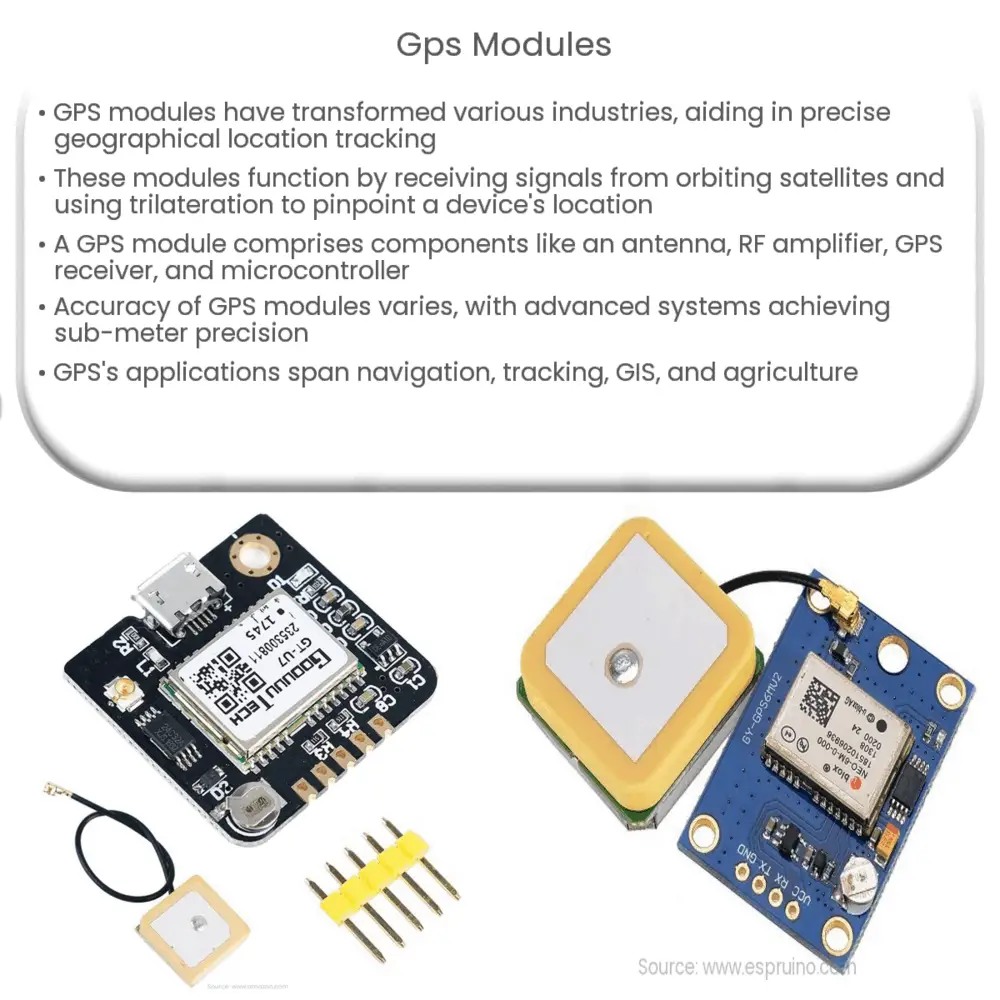Explore the world of GPS modules, their workings, components, and applications. Understand their significance and the future of GPS technology.

Understanding GPS Modules: An Introduction
The Global Positioning System (GPS) is a crucial technology that has drastically transformed numerous industries, from transport and logistics to outdoor sports. The primary instrument in leveraging GPS technology is the GPS module, an electronic device that communicates with GPS satellites to provide geographical location data. This article seeks to offer an in-depth understanding of GPS modules, their workings, uses, and importance in today’s technologically driven world.
How Does a GPS Module Work?
GPS modules work based on a system of satellites that orbit the Earth, transmitting precise microwave signals. These modules receive these signals and use the data to calculate the user’s exact location through a process known as trilateration. Trilateration involves determining the distances to at least three satellites and, using these measurements, pinpoints the device’s position on the globe.
Components of a GPS Module
- Antenna: This component receives GPS signals from satellites. The quality of an antenna significantly influences the performance of a GPS module.
- RF Amplifier: This strengthens the GPS signal for better processing.
- GPS Receiver: The receiver decodes the satellite signals into a format that the device can interpret.
- Microcontroller: This acts as the ‘brain’ of the GPS module, handling calculations and data processing.
Understanding GPS Accuracy and Precision
GPS modules’ accuracy and precision depend on several factors, including the quality of the GPS module, atmospheric conditions, and the satellite’s positioning. The standard GPS module provides an accuracy level within 10 to 15 meters. However, advanced systems with Differential GPS (DGPS) or Real-Time Kinematic (RTK) methods can achieve sub-meter or even centimeter-level accuracy.
The Significance of GPS Modules in Today’s World
GPS modules have an extensive range of applications in modern society. They are key components in systems used for navigation, timekeeping, tracking, and map-making, among others. Whether in our smartphones, cars, or specialized devices, GPS modules have enabled the easy and precise determination of geographic positioning that has become so integral to our daily lives. In the next section, we will dive deeper into the various applications and the future of GPS technology.
Applications of GPS Modules
- Navigation: Perhaps the most widespread use of GPS modules is in navigation. From aviation and marine industries to personal vehicle and pedestrian navigation, GPS has redefined how we move from place to place.
- Tracking: GPS modules are used in tracking systems, helping businesses monitor their fleets and individuals locate lost items or even pets.
- Geographic Information Systems (GIS): These rely heavily on GPS modules to accurately map and model the physical world.
- Agriculture: Precision agriculture uses GPS modules for tasks like mapping field boundaries, managing crops, and navigating tractors.
The Future of GPS Technology
The world of GPS technology is consistently evolving. With advancements in fields such as IoT (Internet of Things), we can expect to see GPS modules becoming even more pervasive. Developments in accuracy and precision, such as RTK (Real Time Kinematics) systems, are also opening up new applications for GPS technology.
Choosing a GPS Module
When selecting a GPS module, several factors should be considered: accuracy needs, power consumption, form factor, and cost. Modules can range from simple, less accurate models for hobbyist applications to highly precise units for professional-grade equipment. It’s essential to choose the right GPS module to suit your specific requirements.
Conclusion
GPS modules have become an integral part of our daily lives, embedded in an astonishing array of technologies that shape the way we navigate, communicate, and interact with the world. Understanding the mechanics and applications of these remarkable devices is key to appreciating the breadth of their impact and potential. With advancements in GPS technology showing no signs of slowing down, the future holds exciting prospects for even more innovative applications.

